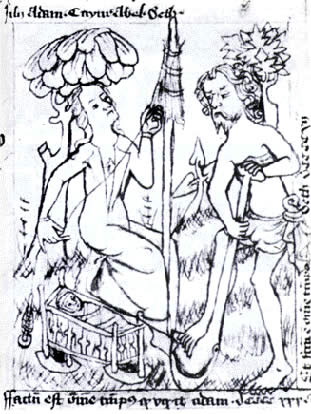As the Man with No Name told Tuco, “there's two kinds of people, my friend: those with loaded guns and those who dig. You dig." If Great-Granda couldn’t afford the suit of armor, or wasn’t ruthless enough to take it by force, you probably belong to a peasant family. Sharecropper grandparents, in my case, first generation to go to college.

Most of us were peasants, peons (a painfully acute sobriquet), and then the Black Death killed so many of us that our labor had to be paid for, and some of the peasants became yeomen, and things got marginally better. We were no longer subject to the random cruelty of the baron’s bastard sons or the droit de seigneur , and even a cat could look at a king. Small scale, the craftsman selling shoes or ironware, started lifting us out of peasantry.
By the time Adam Smith noticed the phenomenon, religious dissenters from the Church of England-- unable to send their sons to the posh Oxford and Cambridge—started technical schools. The new technologies made their children better skilled and more valuable than any spare aristocrat. The stout yeoman bought respectability by marrying aristocrats, as sure as Jenny Jerome’s American father married her off (with substantial dowry) to Lord Randolph Churchill.

A specter was haunting capitalism— not the specter of communism, though that would have its day as a way for the more rapacious peasants, like Stalin and Mao, to prey upon their own kind. No, this was the specter of the corporation: a moneyed collective that will prove every bit as destructive to our species as Mao and Stalin’s collective farms were to the individual.
These business cooperatives-- call them “corporations”-- are mercantile guilds gone mad. Corporation is to small businessman as labor union is to laborer. It seems an obvious corollary-- but instead, corporations paint themselves as defenders of individual liberty, while the labor union-- defender of a peasants’ fair share of profit and health-- is a tyrannical, slovenly mob. And the peasants ate it up, repeated it among themselves, voted against their own self-interest. If the corporate paradigm said shit was sugar, then crackers would be asking for a spoon.
Remember Heinlein's novel Friday in which corporations replaced the nation-states, even waged war on one another? I remember shaking my head at how far out the old man had become, almost as goofy as that time he predicted a religious dictatorship scrapping the Constitution of the United States.
Now I’m wondering if the modern corporation and the Corporate Man signal a return to the days of the pyramid builders. They’re all very proud of the culture that they’ve built, a cathedral built for no god but Mammon. Humans don’t like admitting they’re being played for a sucker, so the pyramid builder, he who sells his labor to a corporation, romanticizes his raison de’etre like a man romanticizes his mistress.
 (And some days it takes more Stones than others...) Where Mythical Bestiary meets Contemporary Culture and Chews On Its Leg Until Covered with Slobber.
(And some days it takes more Stones than others...) Where Mythical Bestiary meets Contemporary Culture and Chews On Its Leg Until Covered with Slobber.
No comments:
Post a Comment